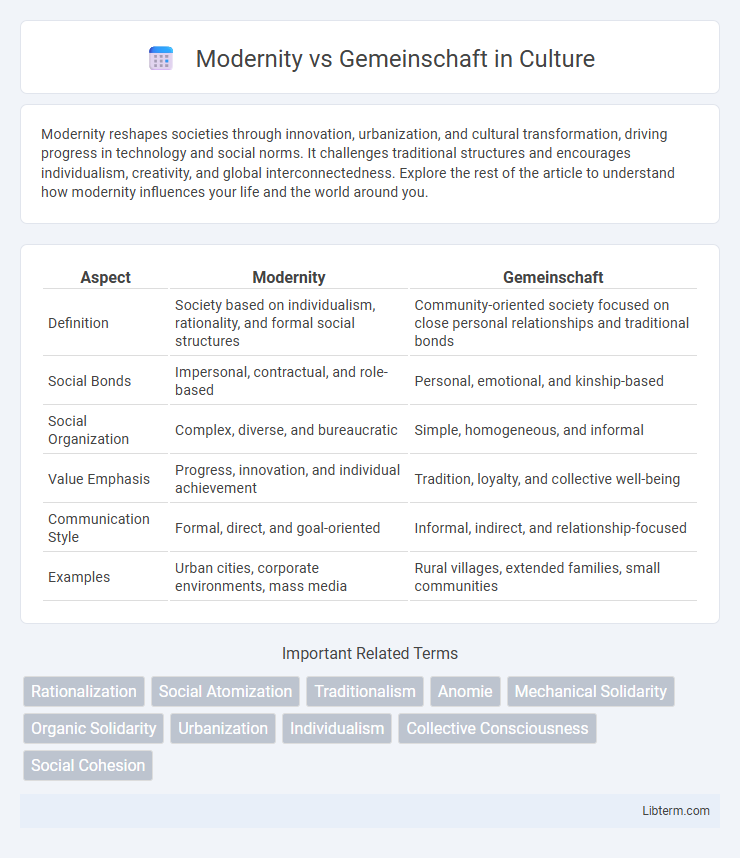Modernity reshapes societies through innovation, urbanization, and cultural transformation, driving progress in technology and social norms. It challenges traditional structures and encourages individualism, creativity, and global interconnectedness. Explore the rest of the article to understand how modernity influences your life and the world around you.
Table of Comparison
| Aspect | Modernity | Gemeinschaft |
|---|---|---|
| Definition | Society based on individualism, rationality, and formal social structures | Community-oriented society focused on close personal relationships and traditional bonds |
| Social Bonds | Impersonal, contractual, and role-based | Personal, emotional, and kinship-based |
| Social Organization | Complex, diverse, and bureaucratic | Simple, homogeneous, and informal |
| Value Emphasis | Progress, innovation, and individual achievement | Tradition, loyalty, and collective well-being |
| Communication Style | Formal, direct, and goal-oriented | Informal, indirect, and relationship-focused |
| Examples | Urban cities, corporate environments, mass media | Rural villages, extended families, small communities |
Defining Modernity: Key Characteristics
Modernity is defined by its emphasis on rationalization, individualism, and industrialization, leading to social structures based on achieved status rather than ascribed roles. It fosters urbanization, secularization, and bureaucratic governance, contrasting sharply with traditional Gemeinschaft's intimate, community-centered relationships. These key characteristics drive societal transformation through technological innovation and diverse, complex social interactions.
Understanding Gemeinschaft: Core Concepts
Gemeinschaft is a sociological concept emphasizing close-knit communities characterized by personal social interactions, strong family ties, and shared traditions. This form of social organization is based on mutual trust, collective conscience, and emotional bonds rather than formal rules or contracts. Understanding Gemeinschaft involves recognizing its foundation in intimate, face-to-face relationships that foster social cohesion and a sense of belonging.
Historical Evolution of Social Structures
The historical evolution of social structures reveals a shift from Gemeinschaft, characterized by intimate, community-oriented relationships rooted in tradition and kinship, to Modernity, defined by Gesellschaft's impersonal, contractual associations driven by individualism and rationality. This transformation accelerated during the Industrial Revolution, when urbanization and economic changes disrupted traditional bonds, fostering more complex and specialized social institutions. Sociologists like Ferdinand Tonnies emphasized this transition as foundational to understanding contemporary societal dynamics and the changing nature of social cohesion.
Individualism vs. Collectivism
Modernity promotes individualism, emphasizing personal autonomy, self-expression, and individual rights within a society driven by rationalization and urbanization. Gemeinschaft embodies collectivism, where social cohesion arises from close-knit relationships, shared values, and communal responsibilities rooted in tradition. The tension between modern individualism and Gemeinschaft collectivism shapes social dynamics, influencing identity formation and community engagement.
The Role of Technology in Modern Societies
Technology in modern societies drives increased connectivity, efficiency, and individual autonomy, contrasting with Gemeinschaft's emphasis on close-knit, traditional community bonds. Digital platforms and automation transform social interactions and economic structures, fostering impersonal, yet expansive networks typical of modernity. This technological shift redefines social cohesion by prioritizing innovation and rationality over communal values and shared cultural heritage.
Social Bonds in Gemeinschaft Communities
Gemeinschaft communities are characterized by intimate, personal social bonds rooted in kinship, tradition, and shared values, fostering strong sense of belonging and mutual support. Social relationships in Gemeinschaft are direct and enduring, based on face-to-face interactions that create tightly knit networks of cooperation and trust. These social bonds contrast sharply with the impersonal, contract-based connections typical of modern, Gesellschaft societies.
Economic Systems: Traditional vs. Modern Approaches
Traditional economic systems in Gemeinschaft societies emphasize local, relational exchanges, barter, and communal sharing rooted in established customs. Modern economic systems characteristic of Modernity prioritize market-driven, capital-intensive production, profit maximization, and complex financial institutions. The shift from communal reciprocity to impersonal market transactions reflects broader social transformations and impacts economic efficiency and social cohesion.
Urbanization and Its Impact on Community
Urbanization accelerates the shift from Gemeinschaft, characterized by close-knit, personal social bonds, to Modernity, where social relations become more impersonal and individualistic. The growth of cities fosters diverse, complex interactions but often weakens traditional community ties and collective identity. This transformation reshapes social structures, emphasizing efficiency and rationality over emotional connections and shared values.
Identity Formation: Modern Self vs. Communal Identity
Modernity emphasizes the development of the modern self as an autonomous, rational individual focused on personal goals and self-expression, contrasting with Gemeinschaft's communal identity rooted in shared traditions, social roles, and collective belonging. Identity formation in modern contexts involves negotiating multiple social roles and embracing individuality, whereas Gemeinschaft fosters continuity through oral traditions and face-to-face relationships that reinforce group cohesion. This tension shapes social dynamics where the modern self seeks differentiation, and communal identity emphasizes unity and social integration.
Navigating the Tensions Between Modernity and Gemeinschaft
Navigating the tensions between modernity and Gemeinschaft involves understanding the shift from tightly-knit, community-oriented social structures to more individualistic, urbanized societies characterized by impersonal relationships. Modernity emphasizes rationalization, innovation, and efficiency, often challenging the traditional values, norms, and intimate bonds that define Gemeinschaft communities. Balancing these dynamics requires fostering social cohesion and collective identity while adapting to the demands of contemporary technological and cultural change.
Modernity Infographic

 libterm.com
libterm.com